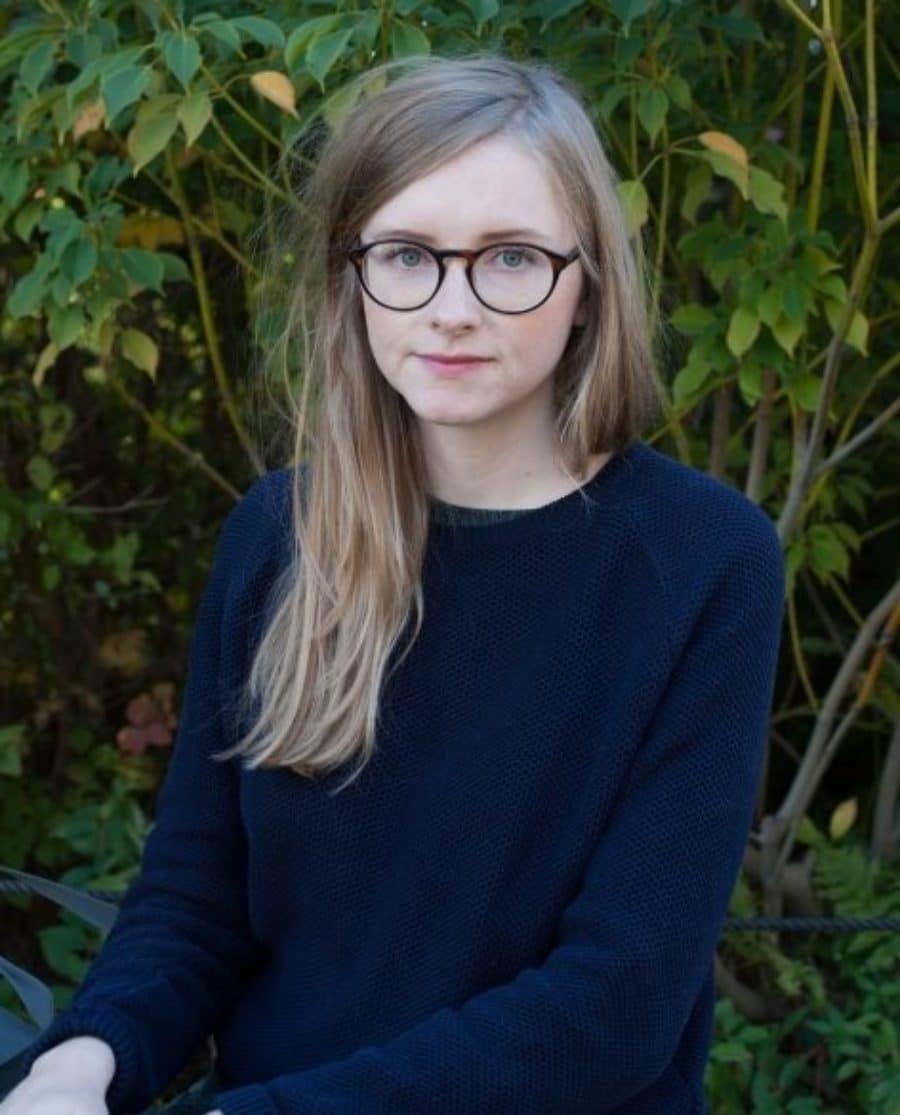‘Nachtbloeiers’ by Ananda Serné: Searching for an Anchor
In a society that suffers increasingly from insomnia, young Eliza is looking for something to hold on to. Charting Eliza’s search for sleep in her debut Nachtbloeiers (Night bloomers) writer and visual artist Ananda Serné gently shakes the reader awake.
Keep a sleep diary. Take sleeping drops. If that still doesn’t help, take some more. Try masturbating. Or why not plant a garden with night flowers, plants that only bloom after the sun goes down. Then when the moonlight is bright enough, all that nocturnal beauty can possibly still make you slumber.
 Ananda Serné
Ananda SernéThese are just some of the things the young Eliza does in an attempt to escape from insomnia that is steadily wearing her out. And she knows a fair amount about not getting enough sleep. At least, she ought to, because she works at the Norwegian Institute for Insomnia in Stavanger.
She came to Norway with its long, dark winters for her then boyfriend Andreas, who works at the same institute. But unlike Eliza, Andreas is an efficient person, someone who gets enough sleep and has his life in order. Their relationship was almost certain to end badly. Although it’s over with Andreas, Eliza keeps working at the Institute, where together with the equally troubled Ratna, she tries to manage the library.
 The cover image of ‘Nachtbloeiers’ is taken from ‘Night-Scented Flowers’, a series of tapestries woven by Serné.
The cover image of ‘Nachtbloeiers’ is taken from ‘Night-Scented Flowers’, a series of tapestries woven by Serné.© Jan Khür / Fotogalleriet Oslo
Eliza didn’t just join the Institute for love. She also wants to conduct a study on the influence a partner has on the quality of sleep. Not so much whether the person you share a bed with tosses or snores during the night, but whether you sleep better if you feel understood, valued, or validated by your partner.
The research proposal that Eliza wants to write runs like a thread through the book, accompanied by notes from her sleep diary and the snapshots she takes every now and then. These usually have something to do with sleep. Such as the image of her father, a cargo skipper who, during a quiet moment on the canals, has a snooze on the deck.
Eliza and her brother grew up on that cargo barge, until their mother decided she had had enough and moved with the children into a flat in Rotterdam. Eliza’s father fell into a depression and eventually surrendered to the water. Eliza’s searching and worrying would seem to be a family trait.
This is also clear when she visits her brother in Taipei, where he is living temporarily. Her trip to Taiwan is one of Eliza’s other attempts to get a grip on her life. Like her brother, she is looking for anchor points, something to hold on to.
Ananda Serné sets Eliza’s journey in a near future, where self-driving taxis are the norm. In that future, sleep has become increasingly problematic. Sleep-deprived people become so noticeable that they are plucked off the street by so-called ‘sleep watchers’, who take these victims of excessive sleep deprivation to so-called slumber clinics.
Not only individuals are looking for guidance, but society as a whole is too
What exactly happens there remains hazy as the night, and a cause for debate between Eliza and the few friends she has. Her mother in Rotterdam states that such a thing could never happen back in the pragmatic Netherlands. People would surely resist it there.
The book’s setting in a conceivable future and a comparable country is clever because it makes you wonder: would we really revolt, here in the Low Countries, if our neighbours were gathered off the street to recover in special hospitals? Or would we comply meekly? It is reminiscent of the various reactions to covid measures by a government trying to gain control on unstable circumstances. Not only individuals are looking for guidance, but society as a whole is too.
And so Nachtbloeiers (Night bloomers) becomes a novel that completely transcends the specific situation of a young woman who is not sleeping well. It is an exploration of the world of sleep through art, literature, and architecture. At the same time the novel offers a critique of the fast-paced lifestyle to which we collectively fall victim, and from which we find it so incredibly hard to escape.

Thanks to the serene, almost business-like writing style, that critique does not even feel like one. It is more like a gentle analysis of a system that drives us all towards insomnia and eventually to the slumber clinics.
Unsurprisingly, Eliza’s search eventually leads her to a slumber clinic too. But will she find the solution to her problems and those of the other insomniacs there? Revealing that would be a spoiler.
Excerpt of ‘Nachtbloeiers’, as translated by Elisabeth Salverda
If Andreas wants to do something, he just does it. Whereas I often do the opposite of what I want. That or I do nothing at all. I once tried to explain this to Andreas. We were in a self-driving taxi on our way to an end-of-year party at the Institute. Andreas was wearing shiny shoes and I was in a dress. Almost every night in the preceding weeks, I had been trying to put together a research proposal, countless attempts at explaining how I wanted to explore the relationship between partner choice and sleep deprivation. My goal was a doctoral position at the Institute in collaboration with the university, but I never got further than a few lines. I would try again at the next vacancy.
In the taxi, Andreas scrolled through the text of his speech.
“When will you hear about that research proposal?” he said.
I looked outside. I thought Andreas would carry on reading, that his question would flit by like the shrubbery along the side of the road. Andreas looked at his screen.
“I’ll try when there’s a new deadline,” I replied. “Then I have a few months to read up.”
“You’ve been reading for two years,” he said.
Lime, rice, kale, I said in my mind.
“I can put in a good word for you.”
“Can we drop by a supermarket?”
“What?”
“The fridge is almost empty and we’re much too early.”
“I typed in the address of the Institute; I don’t know how to change that.”
“Just press stop.”
Andreas pressed several fingers on the screen.
Loser, I thought. But I didn’t say anything.
The taxi stopped at the side of the road. To our left was a parking lot, to our right were terraced houses, no one was out on the street.
“Now what?” said Andreas.
“Now we have to put in the address of the nearest supermarket.”
“There’s a red light flashing on the screen, what does that mean?”
“No idea.”
We ended up being late for Andreas’s speech. It was the first time in his life he had been late for something, he said afterwards.
That was a few months ago when we were still together. I watch the sun sink slowly into the sea behind the glass and put a fourth chocolate in my mouth.
Ananda Serné, Nachtbloeiers, Cossee, 2022, 224 pg.












